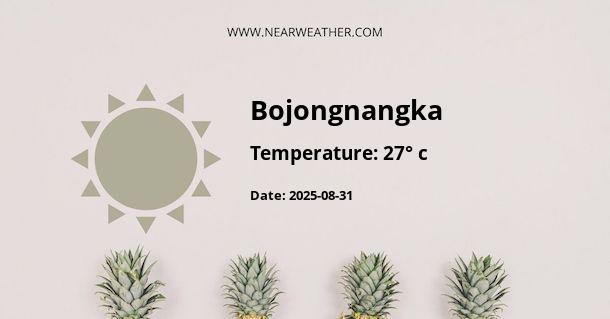Bojongnangka, Indonesia: Weather and Climate Overview
Bojongnangka is a beautiful region located in Indonesia, known for its rich culture, stunning landscapes, and diverse wildlife. Understanding the weather and climate of Bojongnangka is essential for both residents and visitors to effectively plan outdoor activities, agricultural practices, and infrastructure development. This comprehensive guide provides detailed insights into Bojongnangka's climate and weather patterns throughout the year.
Climate Overview
Bojongnangka experiences a tropical rainforest climate, known as Af by the Köppen-Geiger climate classification. The region is characterized by consistent high temperatures, abundant rainfall, and high humidity throughout the year. Bojongnangka's climate is heavily influenced by its proximity to the equator, resulting in minimal temperature variations and distinct wet and dry seasons.
Temperature
The average annual temperature in Bojongnangka is around 26-27°C (79-81°F). Daytime temperatures typically range from 31-33°C (88-91°F) during the hottest months, while nighttime temperatures rarely drop below 23°C (73°F). The consistent warmth in Bojongnangka creates a favorable environment for lush vegetation and a variety of wildlife.
Rainfall
Bojongnangka receives significant rainfall throughout the year, with the wet season extending from November to March and the dry season occurring from April to October. The annual precipitation in Bojongnangka averages around 3,000-3,500 mm (118-138 inches), making it a truly tropical climate. The combination of ample rainfall and consistent warmth supports the region's dense rainforests and agricultural productivity.
Seasonal Variations
The distinct wet and dry seasons in Bojongnangka significantly impact the region's landscape, wildlife, and economic activities. Understanding the characteristics of each season is crucial for various sectors within the community.
Wet Season (November to March)
The wet season in Bojongnangka brings heavy and prolonged rainfall, often leading to flooding in low-lying areas. The humidity during this season is exceptionally high, contributing to the growth of vibrant vegetation and the flourishing of local flora and fauna. Agricultural practices, such as rice cultivation, heavily rely on the abundant rainfall during this period.
Dry Season (April to October)
The dry season in Bojongnangka is characterized by reduced rainfall and slightly lower humidity levels. Although rain is less frequent, the abundant moisture from the preceding wet season sustains the region's lush greenery. The dry season provides favorable conditions for outdoor activities, tourism, and construction projects due to the lower risk of precipitation-related disruptions.
Extreme Weather Events
Bojongnangka is occasionally prone to extreme weather phenomena, including tropical storms, monsoons, and occasional droughts. These events can have significant impacts on the local ecosystems, agriculture, and infrastructure. Adequate preparedness and mitigation strategies are essential to minimize the potential adverse effects of extreme weather events in Bojongnangka.
Conclusion
Bojongnangka's climate and weather patterns play a pivotal role in shaping the region's natural landscapes, biodiversity, and economic activities. Understanding and adapting to the unique tropical rainforest climate is crucial for sustainable development and resilience in the face of climate variability. By embracing the distinct wet and dry seasons and preparing for extreme weather events, Bojongnangka can continue to thrive amidst its stunning natural environment.
A - Bojongnangka's Latitude is -7.331800 & Longitude is 108.249802.
A - Weather in Bojongnangka is 27° today.
A - Climate Conditions in Bojongnangka shows moderate rain today.
A - Humidity in Bojongnangka is 83% today.
A - Wind speed in Bojongnangka is 7.31 km/h, flowing at 174° wind direction. today.
